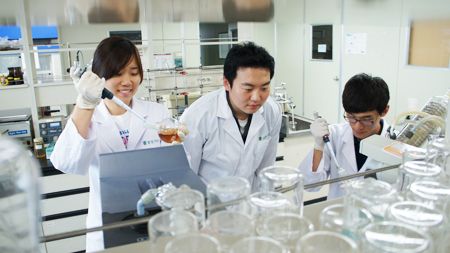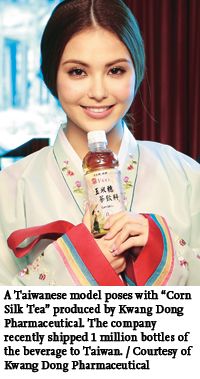
Corn silk tea popular among consumers

Korea’s traditional corn silk tea is drawing public interest in terms of its health effects with more people paying attention to their well-being.
Studies have shown that corn silk carries anti-cancer agents as well as chemicals that prevent aging of the skin.
Research on corn silk has been especially active since 2006 when a leading pharmaceutical company here launched a beverage made from it.
Named Corn Silk Tea, and produced by Kwang Dong Pharmaceutical, sales of the beverage increased from 45 billion won ($40 million) in 2006 to 52.4 billion won in 2011.
The company now exports the drink to countries including the United States, China, Japan and Taiwan where there is a large demand _ it recently shipped 1 million bottles to Taiwan.
Exports stood at 5.3 billion won in 2011 and reached 4 billion won in the first half of this year. Kwang Dong expects to enjoy a continued, stable rise in overseas sales.
“The consistent rise is very unusual because a beverage is often only popular for the first three or four years after it is introduced to the market,” the company said in a press release in September. “And we have to say that the popularity of our product stems from consumers’ growing interest in their health.”
However, Kwang Dong emphasized that it is not for medical use, adding “a consumer should not expect it to improve their health,” although studies have shown that corn silk is widely used in traditional Korean medicine.
The Rural Development Administration (RDA) and Kwang Dong have succeeded in developing the technology to extract maysin from corn silk. Maysin is a type of flavonoid that can reduce cancer risks in some cases.
Researchers have compared multiple maize species and found that “kwangpyungok,” a genetically modified organism from the National Institute of Crop Science, contained the largest amount of maysin.
The protein is being studied for its effect in preventing metastases and its antioxidant activities. Coupled with a new method, the RDA and Kwang Dong can now extract up to 15 times more maysin from maize silk than before.
The two organizations developed a trial product that carries a high amount of maysin and Kwang Dong thinks it will bring more success to the firm when it is commercialized.
“With this production approach, the cost may go up to three times from the current price, said Woo Moon-jae, a researcher at Kwang Dong. “Therefore it may take up to three years until we can make marketable products. However, once we overcome this hurdle, I believe we can integrate maysin into various foods and medications.”
A different study this year showed that corn silk contains substances that can slow down the aging process of the skin.
The Regional Innovation Center (RIC) under the Ministry of Knowledge and Economy said a condensed extract of corn silk in liquid form can be used as an antioxidant and also prevent wrinkles.
The extract increased the number of hyaluronan synthase 2, a substance that helps the human body maintain moisture. The extract also reduced the amount of matrix metalloproteinase-1 that dissolves collagen to prevent wrinkles.
“The experiment was made on cells of mammals so we still need to conduct clinical studies on humans,” the RIC said.
Kwang Dong said it will begin its own research based on the findings by the RIC, adding that it will develop products that improve skin condition.
“It is very meaningful to find that corn silk can be used for various purposes,” a company manager said. “Based on these findings, we’ll develop our beverage into something that can actually help people become healthier.” <The Korea Times/Yi Whan-woo>



